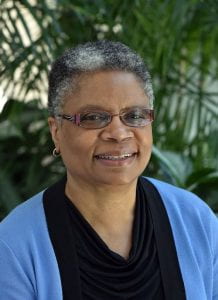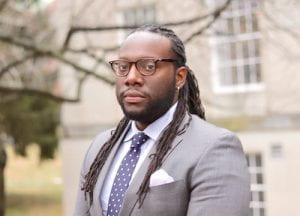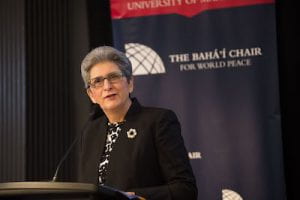Professor June Manning Thomas, Mary Frances Berry Distinguished University Professor Emerita of Urban Planning, Centennial Professor Emerita of Urban and Regional Planning
April 27, 2022
1pm – 2.30pm
Virtual Event Register at: https://umd.zoom.us/webinar/register/WN_ZxoIMjqNSFWI-NF3hgPmew
Abstract:
Join us for a discussion with Professor June Thomas about her new book, Struggling to Learn An Intimate History of School Desegregation in South Carolina. The discussion will be moderated by Professor Julius B. Fleming and Professor Hoda Mahmoudi.
The battle for equality in education during the civil rights era came at a cost to Black Americans on the frontlines. In 1964 when fourteen-year-old June Manning Thomas walked into Orangeburg High School as one of thirteen Black students selected to integrate the all-White school, her classmates mocked, shunned, and yelled racial epithets at her. The trauma she experienced made her wonder if the slow-moving progress was worth the emotional sacrifice. In Struggling to Learn, Thomas, revisits her life growing up in the midst of the civil rights movement before, during, and after desegregation and offers an intimate look at what she and other members of her community endured as they worked to achieve equality for Black students in K-12 schools and higher education.
Speaker Bio:
 Professor June Manning Thomas
Professor June Manning Thomas
June Manning Thomas is Mary Frances Berry Distinguished University Professor Emerita of Urban and Regional Planning, University of Michigan. Her scholarship has focused on the impact of urban planning decisions on post-industrial cities and Black communities. To help increase diverse presence and voice among urban planning faculty, she co-founded the Planners of Color InterestGroup (POCIG), part of the Association of Collegiate Schools of Planning (ACSP). She led POCIGas founding co-chair, and later served as Vice-President and then President of ACSP (2013-15). Her study of the role of spiritual leadership in planning began with Planning Progress: Lessons from Shoghi Effendi (1997) and has continued with other articles and service projects. Her book Redevelopment and Race: Planning a Finer City in Postwar Detroit (1997, 2013), is the standard history of redevelopment, race, and urban planning in Detroit’s 20 th century history, and winner of the1999 ACSP Paul Davidoff prize for best book published in 1997 or 1998 on the theme of social equity in urban planning. She has also co-edited other books on cities, race relations, and planning:Urban Planning and the African American Community (1997), The City after Abandonment (2013),and Mapping Detroit (2015). Her latest book is Struggling to Learn: An Intimate History of School Desegregation in South Carolina (Univ. of South Carolina Press, March, 2022). This semi-autobiographical but archive-sourced narrative describes school desegregation in the 1960s but also explains how Blacks educated their children before that.
Moderators:
 Professor Julius B. Fleming
Professor Julius B. Fleming
Julius B. Fleming, Jr. is an Assistant Professor of English at the University of Maryland, College Park. Specializing in Afro-Diasporic literatures and cultures, he has particular interests in performance studies, black political culture, diaspora, and colonialism, especially where they intersect with race, gender, and sexuality. Professor Fleming is the author of Black Patience: Performance, Civil Rights, and the Unfinished Project of Emancipation (NYU Press 2022), and is beginning work on a second book project that explores the new geographies of colonial expansion and their impact on Afro-diasporic literary and cultural production. His work appears in journals like American Literature, American Literary History, South Atlantic Quarterly, Callaloo, and The Southern Quarterly. Having served as Associate Editor of Callaloo, Professor Fleming is currently serving as Associate Editor of Black Perspectives, the award-winning blog of the African American Intellectual History Society. He has been awarded fellowships from the Woodrow Wilson National Fellowship Foundation, the Mellon Foundation, the University of Virginia’s Carter G. Woodson Institute, and the Social Science Research Council.

Professor Hoda Mahmoudi
Hoda Mahmoudi has held The Bahá’í Chair for World Peace at the University of Maryland, College Park since 2012. As director of this endowed academic program, Professor Mahmoudi collaborates with a wide range of scholars, researchers, and practitioners to advance interdisciplinary analysis and open discourse on global peace. Before joining the University of Maryland faculty, Professor Mahmoudi served as the coordinator of the Research Department at the Bahá’í World Centre in Haifa, Israel. Prior to that, Dr. Mahmoudi was Dean of the College of Arts and Sciences at Northeastern Illinois University, where she was also a faculty member in the Department of Sociology. Professor Mahmoudi is co-editor of Interdisciplinary Perspectives on Human Dignity and Human Rights (Emerald, 2019) and of Children and Globalization; Multidisciplinary Perspectives (Routledge, 2019). Professor Mahmoudi is also co-author of A World Without War (Bahá’í Publishing, 2020), co-editor of The Changing Ethos of Human Rights (Elgar, 2021), and most recently co-editor of Fundamental Challenges to Peace and Security: The Future of Humanity (Palgrave Macmillan, 2022), and co-editor of Systemic Racism in America: Sociological Theory, Education Inequality, and Social Change (Routledge, 2022).
This event is co-sponsored by:

About the Author:
 Kate Seaman is the Assistant Director to the Bahá’í Chair for World Peace where she supports the research activities of the Chair. Kate is interested in understanding normative changes at the global level and how these changes impact on the creation of peace.
Kate Seaman is the Assistant Director to the Bahá’í Chair for World Peace where she supports the research activities of the Chair. Kate is interested in understanding normative changes at the global level and how these changes impact on the creation of peace.
You can find out more about the Bahá’í Chair by watching our video here.
